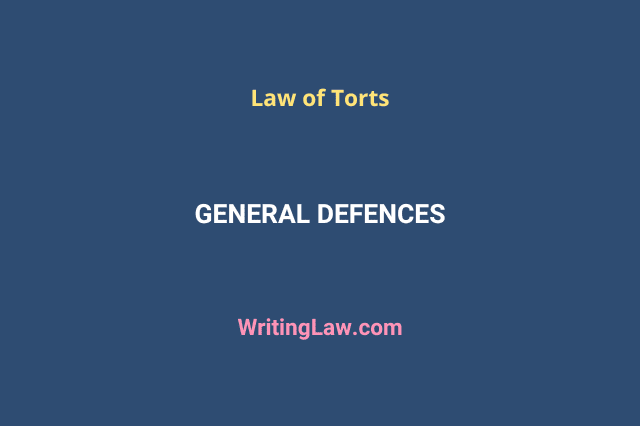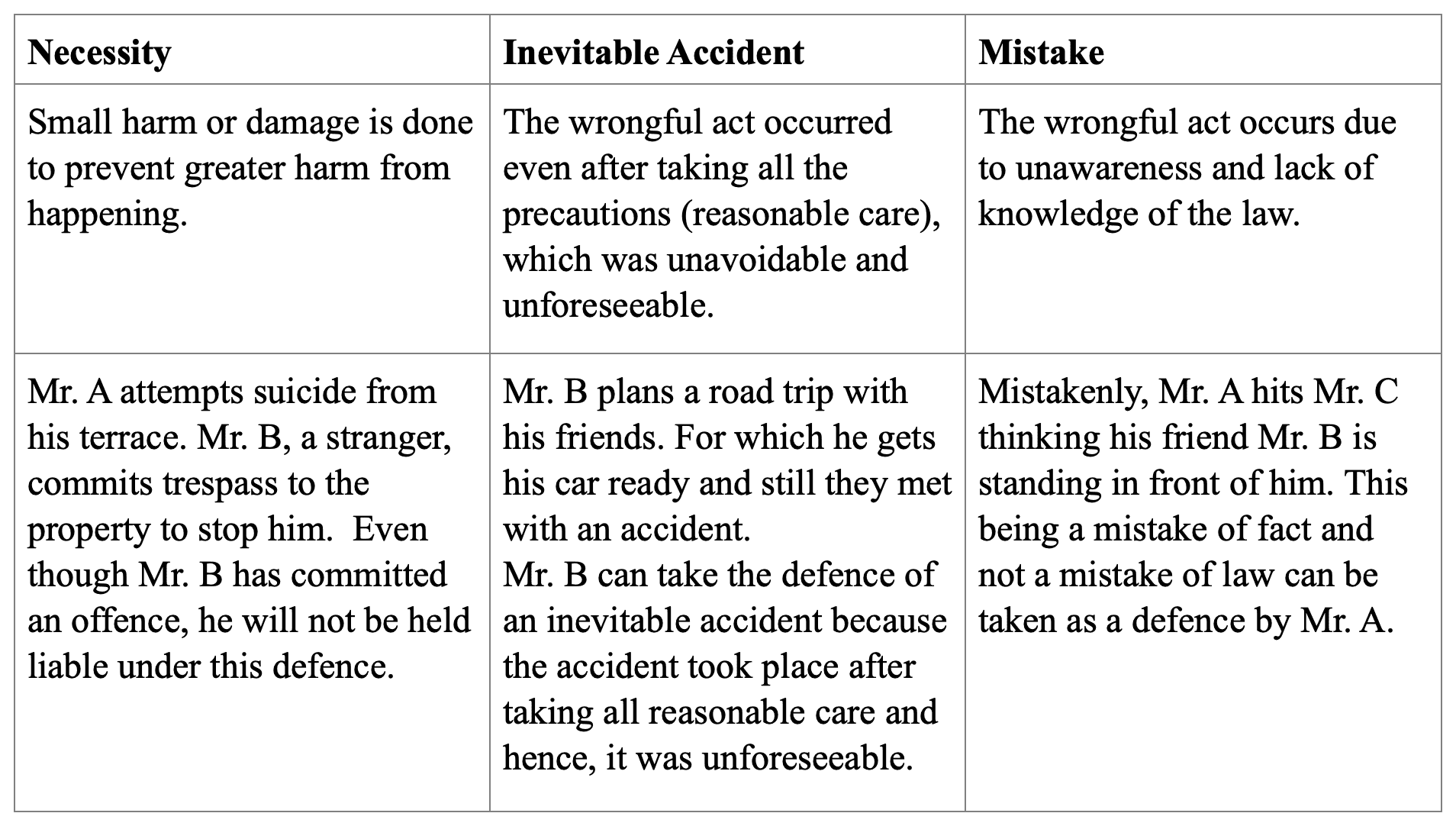
In this article, you will learn about general defences available under the Law of Torts in India with easy examples. At last, you will read about the differences between necessity, inevitable accident, and mistake.
8 General Defences Under the Law of Torts
The Law of Torts contains some general defences available to parties to escape from the liability of any act or omission. They are as follows:
1. Volenti Non-Fit Injuria
Volenti Non-Fit Injuria is a Latin legal maxim that means “voluntarily taking a risk.” It is a situation where a party puts itself in a dangerous situation and incurs damage. To avail the defence of Volenti Non-Fit Injuria, it is necessary to prove that the plaintiff knew about the consequences and still gave consent to it.
Such consent to the injury should be free of threat and compulsion. The consent could be either through a statement (expressed consent) or conduct (implied consent).
For example, Mr A buys a ticket to watch a live cricket match in the stadium. During the game, Mr A gets hit by the ball. Mr A cannot claim damages in this scenario, as he has impliedly given consent to such a situation.
Related: What Is Volenti Non-Fit Injuria Under the Law of Torts?
2. Plaintiff – the Wrongdoer
Plaintiff – the wrongdoer as a defence is applicable when the plaintiff himself does something wrong and causes damage to himself. This defence is complemented by one of the most common law principles, which is ‘one must approach the court with clean hands.’ This bars the plaintiff from claiming damages from someone else because of harm caused to him due to his own mistake.
For example, Mr A trespasses into Mr B’s house and gets bitten by Mr B’s dog. Now, Mr A claims damages from Mr B, to which B takes this defence and refuses to make such a claim because here Mr A, being the plaintiff, has also committed an offence of trespassing and hence cannot claim any damages.
3. Inevitable Accident
Inevitable accidents are those that cannot be escaped even after taking full reasonable care. Inevitable accidents are unforeseeable, which means accidents and injuries caused to the party could not be predicted. The defendant avails this defence to escape liability when he has taken reasonable care on his part but still could not stop the accident from happening.
For example, Mr A got his car serviced before going on a trip with his friends. Still, he met with an accident due to the failure of the brakes. Here, even after taking proper precautions, Mr A and his friends could not escape from the accident. Hence, it amounts to an inevitable accident.
4. Act of God
The Act of God is an uncontrollable and unpredictable natural force. It covers all the natural calamities that are beyond the control of the human hand. ‘Vis Major’ is a Latin version of ‘superior force’ or ‘the Act of God.’
For example, due to the cyclone in the village, the roofs of many houses flew away. People claimed damages from the builder, to which the builder refused by taking the defence of the Act of God.
5. Private Defence
This defence can be used to get away with the liability of causing injury to the other party in order to protect oneself. For private defence to be applicable, it must be ensured that the party was under attack or threat from the other party. The degree of defence should be proportionate to the degree of attack (it should not be higher than the degree of the attack or threat). And it should be ensured that the defence taken was for one’s protection and not for any revenge purpose.
For example, Mr A, a thief, entered Mr B’s house and threatened him to give all the valuable things, and if Mr B did not comply, Mr A would kill Mr B. To prevent himself, Mr B banged Mr A’s head with an object available nearby. In this case, Mr B can take the defence of private defence, as it was to protect himself, and the degree used was also proportionate without any malice intention.
6. Mistake
Mistakes are of two types: Mistake of Fact and Mistake of Law.
A mistake of fact is when a person commits an offence because of a misunderstanding of some facts but did not intend to do so. But the mistake of law (ignorance of the law) is no excuse and not acceptable, as stated in the Latin maxim ‘Ignorantia juris non excusat.’ Hence, it is not considered a defence in the Law of Torts. Otherwise, people would start taking this defence as an excuse to commit offences irrationally.
A mistake of fact is considered a defence and eliminates the burden of the defendant by being an exception.
For example, Mr A stepped out during the COVID-19 nationwide lockdown imposed by the central government under the Epidemic Disease Act of 1897. When caught, Mr A said he did not know about this law. In this case, Mr A cannot take the defence of mistake, as ignorance of the law is no excuse.
7. Necessity
Necessity as a defence is taken when one party injures the other party to protect him from some major damage. To avoid greater harm, small harm done to a party can be avoided. But it should be proven that the step taken was necessary.
For example, Mr A’s house is on fire. To get into Mr A’s house and to rescue him, Mr B trespasses Mr C’s house. So, here the minor harm, i.e., trespass, can be ignored to protect Mr A from greater harm.
8. Statutory Authority
If a party does any damage under any authority driven by a statute passed by the government, then it is considered a valid defence. But the body, having the authority, must ensure that such defences are availed in a bona fide manner and no irrational decision is taken. Any scope of carelessness is not entertained.
For example, the roads of the XYZ colony were under construction upon the orders of the municipal corporation. Due to this, colony members were facing some problems. Under no circumstances the colony members can claim damages, as the municipal corporation can take the defence of statutory authority.
Difference Between Necessity, Inevitable Accident, and Mistake
Necessity, inevitable accident, and mistake being somewhat similar, differ from each other on the below-stated lines.
- Necessity: Small harm or damage is done to prevent a greater harm from happening.
- Inevitable accident: The wrongful act occurred even after taking all the precautions (reasonable care), which was unavoidable and unforeseeable.
- Mistake: The wrongful act occurs due to unawareness and lack of knowledge of the law.
Example:
- Necessity: Mr A attempts suicide from his terrace. Mr B, a stranger, commits trespass to the property to stop him. Even though Mr B has committed an offence, he will not be held liable under this defence.
- Inevitable accident: Mr B plans a road trip with his friends for which he gets his car ready, and still they meet with an accident. Mr B can take the defence of an inevitable accident because the accident took place after taking all reasonable care, and hence, it was unforeseeable.
- Mistake: Mistakenly, Mr A hits Mr C thinking his friend Mr B is standing in front of him. This being a mistake of fact and not a mistake of law can be taken as a defence by Mr A.
Here is the above information in tabular form:

Read Next:
1. What is Strict Liability and Absolute Liability
2. Concept of Vicarious Liability Under Tort Law
3. What Is Injurious Falsehood and How It Differs From Defamation
- What Does “Justice Delayed Is Justice Denied” Mean? - 28th April 2023
- What Is Volenti Non-Fit Injuria Under the Law of Torts? - 25th April 2023
- What Are the Differences Between Possession and Custody? - 24th April 2023







